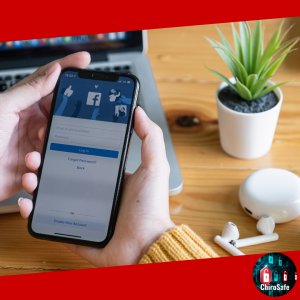Is Your Facebook Account Up for Grabs?
April 4, 2023
In today’s digital age, passwords are the keys to our online lives. They protect our sensitive information from prying eyes and cybercriminals. However, not all passwords are created equal, and not all users take the necessary steps to protect their accounts. That’s why it’s crucial to understand the importance of secure passwords and multi-factor authentication.
Let’s start with the basics. A secure password is one that is complex and difficult to guess. It should be a combination of upper and lower case letters, numbers, and symbols. Many people make the mistake of using simple passwords such as “password123” or “qwerty,” which are incredibly easy to crack. Cybercriminals use sophisticated algorithms that can guess millions of passwords per second. In fact, according to a recent report, “123456” and “password” are still the most commonly used passwords online, despite being the easiest to crack.
So, how do you create a secure password? One strategy is to use a password manager, which can generate strong passwords for you and store them securely. At ChiroSafe, our preferred password manager is Roboform. Originally released in 1999, they have a proven track record of success having never been hacked, unlike too many of their competitors. But don’t take our word for it, they were also named 2023 Editors Choice by Best Reviews. (Note: this blog is NOT sponsored by Roboform. We are NOT affiliated with Roborm other than as their customer. We receive no compensation or perks for recommending their services.)
Another strategy is to create a passphrase, which is a longer password made up of several words. For example, “correct horse battery staple” is a famous passphrase created by the webcomic xkcd. Passphrases are easy to remember, but difficult for a computer to guess. Just don’t use that one since it’s already well known.
Multi-factor authentication (MFA) adds an extra layer of security to your accounts. Instead of just relying on a password, MFA requires an additional form of identification, such as a fingerprint or a code sent to your phone or email. This means that even if a cybercriminal guesses your password, or bought it from a data breach, they still can’t access your account without the second factor.
Real-world examples show the importance of secure passwords and MFA. In 2012, LinkedIn suffered a data breach that exposed over 167 million passwords. The passwords were stored in an unsalted SHA-1 hashed format, which made them easy to crack. Many of the passwords were simple, such as “linkedin” and “123456.” This breach highlights the importance of using strong passwords and storing them securely.
In another example, in 2014, hackers stole photos of celebrities from their iCloud accounts. The hackers were able to gain access to the accounts by guessing weak passwords and using phishing techniques. This incident shows the importance of using unique passwords for each account and enabling MFA wherever possible.
More recently, in 2018, Facebook suffered a data breach that affected nearly 50 million accounts, and AGAIN in 2021 another massive data breach, one of its largest, affecting over 530 million accounts. The 2021 incident leaked names, phone numbers, account names, and passwords to the public. These breaches highlight the importance of using MFA to protect against unauthorized access. Each time the compromised data is sold to hackers, millions of Facebook users are at risk of losing their accounts. But if you have multi-factor authentication, they won’t be able to get in, even with your password.
Now, this all seems a bit heavy and depressing so let’s add some humor to the mix. Imagine a scenario where a cybercriminal tries to guess your password. They start with “password123,” but that doesn’t work. They move on to “qwerty,” but still no luck. They try “correct horse battery staple,” but you’re one step ahead with MFA. They’re left scratching their head, wondering how you managed to outsmart them.
In all seriousness, the consequences of a data breach can be devastating. Cybercriminals can steal your identity, drain your bank account, and even blackmail you with sensitive information. That’s why it’s crucial to take the necessary steps to protect your accounts. Use strong, unique passwords and enable MFA wherever possible. Regularly update your software and security features to stay one step ahead of potential threats. Your online security is in your hands, so don’t take it lightly. And if you think you need a few extra hands for the best possible online security, my team and I are here to help.
– Lee Frazier, Founder of ChiroSafe, has over 30 years experience in IT and cybersecurity. He has a passion for using his knowledge and experience, and a group of specially curated enterprise level software tools, to ease the burden and confusion of cybersecurity and HIPAA HITECH compliance for chiropractors. Lee and his team at ChiroSafe serve as a trusted partner in securing the sensitive data and systems of their clients in 23 states, providing customized solutions, 24/7 proactive monitoring, and exceptional customer service across five time zones.




Leave a Reply
Want to join the discussion?Feel free to contribute!